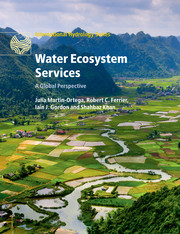Book contents
- Frontmatter
- Contents
- List of contributors
- Preface
- 1 Introduction
- 2 What defines ecosystem services-based approaches?
- Part I Addressing global challenges
- Part II Applying frameworks for water management and biodiversity conservation under an ecosystem services-based approach
- Part III Assessing water ecosystem services
- Part IV Broadening the perspective
- 15 Ecosystem services-based approaches to water management: what opportunities and challenges for business?
- 16 Key factors for successful application of ecosystem services-based approaches to water resources management: the role of stakeholder participation
- 17 Cultural ecosystem services, water, and aquatic environments
- 18 The psychological dimension of water ecosystem services
- 19 The interface between human rights and ecosystem services
- 20 Water ecosystem services: moving forward
- Index
- Plate Section
- References
20 - Water ecosystem services: moving forward
from Part IV - Broadening the perspective
Published online by Cambridge University Press: 05 May 2015
- Frontmatter
- Contents
- List of contributors
- Preface
- 1 Introduction
- 2 What defines ecosystem services-based approaches?
- Part I Addressing global challenges
- Part II Applying frameworks for water management and biodiversity conservation under an ecosystem services-based approach
- Part III Assessing water ecosystem services
- Part IV Broadening the perspective
- 15 Ecosystem services-based approaches to water management: what opportunities and challenges for business?
- 16 Key factors for successful application of ecosystem services-based approaches to water resources management: the role of stakeholder participation
- 17 Cultural ecosystem services, water, and aquatic environments
- 18 The psychological dimension of water ecosystem services
- 19 The interface between human rights and ecosystem services
- 20 Water ecosystem services: moving forward
- Index
- Plate Section
- References
Summary
Understanding water ecosystem services requires both an elucidation of the interrelationships between hydrology, landscapes and ecology, and a contextualization of how water influences human livelihoods and wellbeing and how ecosystems themselves are affected by human activities. Ecosystem services-based approaches, as defined in this book, aim to understand these complex relationships to support more efficient and sustainable decision-making. Society needs to recognize the requirement to balance and manage the benefits derived from water resources, rather than simply managing the resource itself (United Nations Environmental Programme 2009). These benefits come from the realization of a whole range of provisioning, regulating, and cultural services provided by ecosystems. This way of interpreting water systems and water resources represents a change from traditional sectoral control policies and approaches to delivering an integrated view of natural resource management.
In this book the editors and authors took up the challenge, ten years after the publication of the Millennium Ecosystem Assessment (2005), of reflecting on what has been achieved, what lessons have been learnt, and how to improve the application of ecosystem services-based approaches for managing water ecosystems in the future. By proposing a structured definition of ecosystem services-based approaches (in Martin-Ortega et al.) and exploring the forefront of their application at the conceptual level and through a series of national and regional case studies from across the world, the authors have completed a comprehensive vision of the current knowledge and challenges of applying ecosystem services-based approaches to address water challenges.
In this concluding chapter we reflect upon the key messages that have emerged from the discussions contained in this book and on the way forward. We organize this discussion around the four parts in which the book is structured.
20.1 HOW CAN ECOSYSTEM SERVICESBASED APPROACHES HELP ADDRESS MAJOR GLOBAL CHALLENGES?
Capon et al., Febria et al., and Salman and Martinez explore how ecosystem services-based approaches have been, and can be, applied to address three of the critical global challenges that humanity currently face, namely climate change, biodiversity loss, and meeting the growing population's food and energy demands (notably in the developing world).
- Type
- Chapter
- Information
- Water Ecosystem ServicesA Global Perspective, pp. 170 - 173Publisher: Cambridge University PressPrint publication year: 2015
References
- 2
- Cited by

